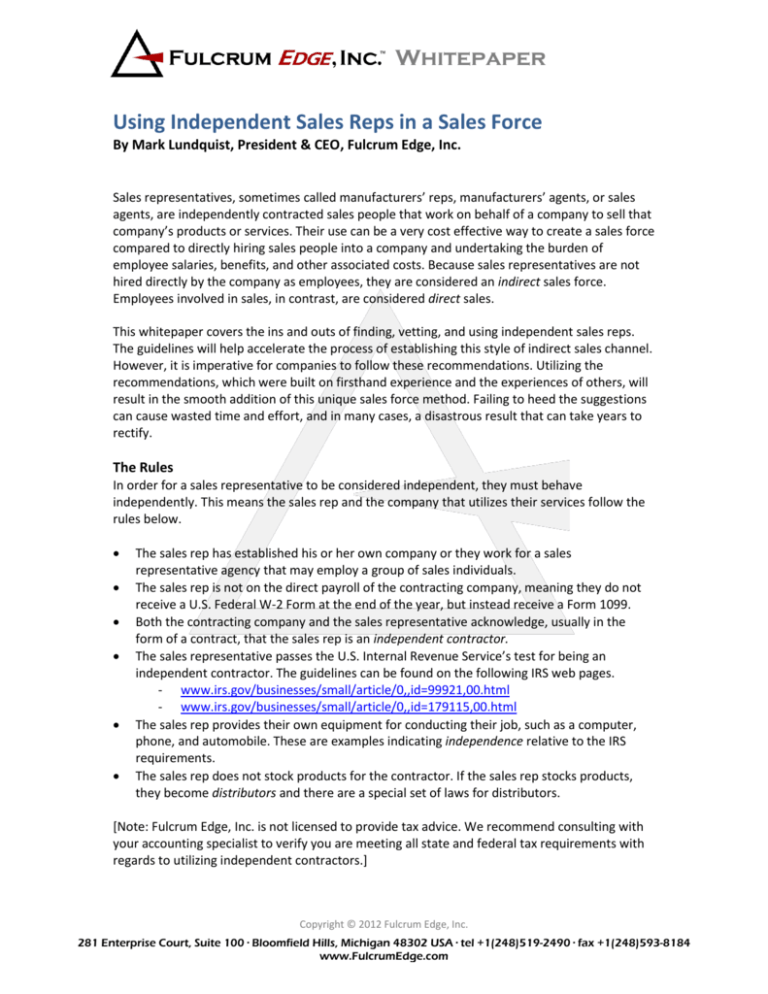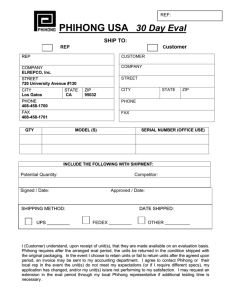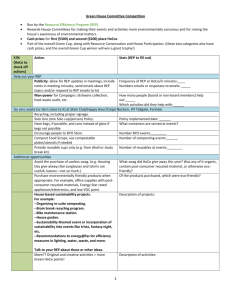Whitepaper Using Independent Sales Reps in a Sales Force
advertisement

Whitepaper Using Independent Sales Reps in a Sales Force By Mark Lundquist, President & CEO, Fulcrum Edge, Inc. Sales representatives, sometimes called manufacturers’ reps, manufacturers’ agents, or sales agents, are independently contracted sales people that work on behalf of a company to sell that company’s products or services. Their use can be a very cost effective way to create a sales force compared to directly hiring sales people into a company and undertaking the burden of employee salaries, benefits, and other associated costs. Because sales representatives are not hired directly by the company as employees, they are considered an indirect sales force. Employees involved in sales, in contrast, are considered direct sales. This whitepaper covers the ins and outs of finding, vetting, and using independent sales reps. The guidelines will help accelerate the process of establishing this style of indirect sales channel. However, it is imperative for companies to follow these recommendations. Utilizing the recommendations, which were built on firsthand experience and the experiences of others, will result in the smooth addition of this unique sales force method. Failing to heed the suggestions can cause wasted time and effort, and in many cases, a disastrous result that can take years to rectify. The Rules In order for a sales representative to be considered independent, they must behave independently. This means the sales rep and the company that utilizes their services follow the rules below. The sales rep has established his or her own company or they work for a sales representative agency that may employ a group of sales individuals. The sales rep is not on the direct payroll of the contracting company, meaning they do not receive a U.S. Federal W-2 Form at the end of the year, but instead receive a Form 1099. Both the contracting company and the sales representative acknowledge, usually in the form of a contract, that the sales rep is an independent contractor. The sales representative passes the U.S. Internal Revenue Service’s test for being an independent contractor. The guidelines can be found on the following IRS web pages. - www.irs.gov/businesses/small/article/0,,id=99921,00.html - www.irs.gov/businesses/small/article/0,,id=179115,00.html The sales rep provides their own equipment for conducting their job, such as a computer, phone, and automobile. These are examples indicating independence relative to the IRS requirements. The sales rep does not stock products for the contractor. If the sales rep stocks products, they become distributors and there are a special set of laws for distributors. [Note: Fulcrum Edge, Inc. is not licensed to provide tax advice. We recommend consulting with your accounting specialist to verify you are meeting all state and federal tax requirements with regards to utilizing independent contractors.] Copyright © 2012 Fulcrum Edge, Inc. 281 Enterprise Court, Suite 100 · Bloomfield Hills, Michigan 48302 USA · tel +1(248)519-2490 · fax +1(248)593-8184 www.FulcrumEdge.com Before You Begin … Build a Business Model Most companies believe they should begin hiring sales reps when they decide they need to begin selling their product or services. The concept sounds reasonable, but the first thing to do before hiring sales reps is to establish a sales model. If you have not built a solid sales model, it will be difficult to find a good (emphasis on “good”) sales agent to represent your company and its products and services. Remember, you are selling your company to the sales rep and much as the sales rep is selling their capabilities to you. The following subsections identify many of the key items you need to have ready before hiring an independent sales agent. Marketing Strategy Have you determined which market segments your company intends to serve? Have you established sales or market territories? It is important to provide focus for any type of salesperson. Clearly identifying where you want them to sell and where you do not want them to sell prevents wasted time. Lead Generation Strategy Establishing a market strategy also helps identify a lead generation strategy. Although one reason for hiring an experienced sales rep is to utilize their contacts as leads, companies should not rely entirely on just the sales rep to generate leads. Sales reps will certainly generate leads, but their main function is to create sales opportunities and close deals, based on leads. Marketing Collateral It is challenging to sell a company’s wares when there are no tools or poor tools to do so. Would you use a plumber without a pipe wrench or a carpenter without a hammer and saw? It is no different for a sales rep. They (and you) need tools to sell. Marketing and sales collateral are those tools of the trade. Ensure your website is professional-looking, up to date, and reflects the market you are trying to enter. Examine your sales materials for quality and relevance to the market, or create materials if they don’t exist. Training A training program, whether formalized or not, is often overlooked by companies when hiring a sales force. Remember, your company and its products and services are new to the sales rep. They need training to educate themselves on how you operate, your company’s history, its focus, how your products work, your relevant differentiating benefit in selling against your competitors, and who to go to for assistance when there are problems. Sales Forecast Develop an early stage sales forecast for each sales territory. The final sales forecast should be jointly developed by the company and the sales rep, but there needs to be a starting point for two reasons. First, an intelligently created sales forecast provides a prospective sales rep with an idea of the value of the territory they may be managing. Secondly, applying various commission structures to the territory’s sales forecast will help you assess the income-generating capability of the territory for a sales rep. Many companies never calculate the effective earning power of a territory and miscalculate commissions or fail to secure good sales reps. Experienced sales representatives will always attempt to determine the value of a territory and the resulting value will become the main basis for accepting or rejecting a position with a company. Copyright © 2012 Fulcrum Edge, Inc. Page 2 Commission Structure You must analyze the existing or projected financials of your company’s products or services to determine the margins available for paying sales commissions. You may be evaluating whether to hire direct sales people or utilize independent sales agents. Make sure you accurately account for all sales force-related cost of sales for both scenarios in order to form a proper comparison. Once you have decided on a range of commissions, conduct research to determine typical commission structures for your market before conducting serious discussions with a sales rep. Experienced sales reps are expecting you to be prepared with appropriate numbers. They know what they need to make a living and rely on you not to present ridiculous offers. Nothing makes a sales rep run to the hills faster than a company that tries to sell the idea of low commissions with lots of work. Contracts & Agreements Do not wait until you find a viable candidate to begin constructing an independent sales rep agreement. Hire an attorney versed in sales rep agreements to draft an appropriate contract that you can have ready for presentation or negotiation with your sales rep candidate. You should also have a Non-disclosure & Confidentiality Agreement ready for signature by the sales rep to protect your company and its assets. Measurements and Expectations Develop a set of expectations for a sales rep. How much time do you expect them to be working on your company’s behalf? Remember, most sales agents represent more than one company – and yours is the newest one with the lowest sales volume at the beginning. Do not overestimate how much time they will devote to your company. However, it is perfectly reasonable to set expectations. Your goal is to keep your company “top of mind” for the sales rep. Make sure you clearly explain how you want to be kept informed of their activities. Will you expect written trip reports, input into Customer Relationship Management (CRM) programs, or attendance (live or by phone) at weekly or monthly sales staff meetings? How will you handle expenses with regards to what your company will cover versus what you expect the sales rep to cover, and how quickly expense reports must be submitted. Support Determine what type of support your company will provide to the sales rep. How often will you or a member of your team go on sales and support calls with the sales agent? Leaving sales reps alone in the field creates four key problems: 1) after a while your company is no longer “top of mind” and the time they sell on your behalf diminishes; 2) lack of oversight encourages lack of attention; 3) sales people that feel abandoned begin to lose an allegiance for the company, and; 4) your company still needs to establish a relationship with the customer, not just the sales rep. You must also consider other support resources for the sales rep such as engineering support, proposal assistance, cost estimating, field service, and order entry service. They are sales people, probably with solid skill sets, but they cannot do everything. How to Find a Good Sales Rep There are lots of ways to find a good sales rep. There are even more ways to find a bad sales rep. Finding high quality sales representatives is a recruiting process, just like hiring a high Copyright © 2012 Fulcrum Edge, Inc. Page 3 quality employee. Let’s start with the way most companies approach finding a sales rep, and then I’ll explain why this is a bad idea. What not to do Most companies set up a booth at a trade show to show off their products or services to potential customers. Sales reps frequently troll these shows looking for new companies to represent. Simultaneously, companies are hoping to find sales reps interested in representing their offerings. The typical scenario is the sales rep begins chatting with a person at your booth and becomes excited about your product and the potential for it in the market. The company representative is thrilled that someone else sees the potential with the same excitement they have. The result: a match made in heaven – two people in love with the same product. The company signs up the sales rep with an exclusive, multi-year agreement to sell their product over a vast territory and the work begins. So, what is the problem with this model? 1. There was no significant interviewing process. The decision to bring the representative on board was based on emotion, not analysis 2. There was no referral check conducted on the rep to determine the extent of their experience and quality of relationships with current sales customers. 3. There was no background check to verify the sales rep accurately represented their professional and educational experience. 4. There was no discussion about the business model of the company and how the sales rep fits into that business model – a sure sign the sales rep is not experienced. No high quality sales rep would sign up with a company without understanding the business model. 5. It makes no sense to sign up a sales representative for large swaths of territory. Sales reps are usually one-man operations with limited traveling capability. 6. There were no expectations or performance measurements established. Exclusive, multi-year agreements are fine, but need to be executed in a controlled manner with performance goals and milestone measurements. What to do First, decide on the factors important for selecting a sales representative. The key qualifications and hiring factors for an independent sales rep should be no different than a job description you would create for hiring an employee. Second, utilize a multitude of methods for finding sales agents. Finding them at trade shows and conferences is a very effective means; however, you should also consider some of the following methods. Talk to current or potential customers and ask them who they like, but be careful, you could cause problems if you do not select someone they suggest or need to terminate the contract with the rep due to lack of performance. Conduct an Internet search under terms such as “sales representative” and the industries are targeting. You can also utilize professional sales rep search firms such as www.SalesRepHunter.net or www.manufacturers-representatives.com. Lastly, place an advertisement in industry publications or in sales rep associations such as Manufacturers’ Agents National Association (www.manaonline.org) seeking a sales representative. Note that there are many manufacturers’ and sales rep organizations focused on Copyright © 2012 Fulcrum Edge, Inc. Page 4 specific industries, so use the Internet to determine whether there is one specific to your targeted industry. Third, entertain many candidates for the position. Recruiting a sales rep is the same as hiring an employee. You wouldn’t consider only one applicant for a job, so why would you only consider one applicant for a sales rep position? Fourth, interview…interview…interview. I recommend three to four interviews minimum for any position, direct or indirect. Start with a phone interview. A phone interview saves you time and money and also tests out the sales rep’s phone skills. Much of the time, the sales rep will be talking with customers on the phone, so phone skills are very important. The second interview (or first, if a phone interview was not conducted) should take place in your office. You should own the space of the first “live” interview. The interview does not need to be confrontational, but guaranteed the sales rep will be on their best behavior if the interview is in your office. Expect the interviewee to be wearing their best outfit, maintaining their best manners, and doing their best job of selling themselves to you. If the candidate passes this test, the next interview should be over food. I am a big believer in breaking bread with a serious candidate for the following reasons. • • • Sales people will frequently conduct business outside of the standard business environment such as over lunch, dinner, a sporting event, or at a trade show or conference. It is important to witness their behavior in this type of environment. Does the potential sales rep maintain good manners at the table or do they eat like a slob? Sharing a meal together usually causes most candidates to let down their guard and reveal their real persona. They will be more open to sharing their real thoughts rather than providing rehearsed replies to interview questions. Interviewing in a neutral space also relaxes the candidate, again causing them to reveal their real style and manner. After the previous interview, conduct one more at whichever location you deem appropriate; your office, their office, or a neutral spot. I refer to this as triple redundancy. Triple redundancy is a concept used in aircraft and spacecraft design. If one system reports a problem, but the other two show everything is okay, then things are probably okay. However, if there were only two systems and one reported an issue, which one do you trust, the one that reported the problem or the one that says everything is okay? Interviewing is the same way. Three interviews provides a better measurement of your sense of the candidate. If all three interviews went well, you probably have a good candidate. If one interview went poorly, but the other two were good, the bad interview could be due to a random bad day for you or the candidate. It is probably worth bringing the candidate back for one additional interview to verify the reason for the bad day. However, if you only had two interviews and one was not good, are you dismissing a potentially good candidate because of a failure that could be due to you having a bad day or the candidate being out of sorts due to illness? What You Need to Find Out Finding a great sales rep is like mining; you need to dig to get the gems. Your hope is two-fold: 1) you have an enticing opportunity and; 2) you can find a rep that is looking to add one more Copyright © 2012 Fulcrum Edge, Inc. Page 5 company to their list of accounts. A great sales rep is probably already well engaged with other companies, but that does not mean that none of them have room for one more account. The Line Card The list of companies a sales agent represents is known as their line card. Always find out how many companies or products the agent represents. Most reps will only handle four to six accounts, with a few stretching to ten accounts. You want to make sure the sales rep does not handle too many companies or they will be stretched too thin and cannot spend the necessary time representing your company. You must also require the sales rep to provide you with the list of companies they represent. The companies on their line card provides you with some key information. If the companies are complementary, it probably means the sales rep is focused on solution selling – the idea of bundling many products and services together into one larger, strategic solution. This means your company will probably be well represented and will quickly be brought into the reps sales activities. If the list of companies is disjointed, the sales rep is probably more of a widget sales or order taker. This style may be appropriate for lower cost, commodity types of products or services, but is not usually well suited for products or services at higher prices or that require consultative selling. The line card will also identify any areas of potential overlap between companies. You do not want to hire a sales representative that already represents a competitive product or service. Trust, but Verify Ask for permission to contact past or current customers. Customers can be a valuable reference for gauging the strengths and weaknesses of a sales rep. If the sales rep used to work for a company, ask for references at their previous place of employment. Make sure to get a copy of the sales rep’s resume or CV. Verify their professional employment and education is accurate. If there are unusual gaps in their employment history, ask about them and do not settle for any answer other than one that truly answers the question and is believable. Not all sales reps decide to become sales reps based on a career choice. Some of them were poor direct sales people that lost their jobs and are now trying to make it on their own. They may still be poor sales people. Lastly, examine the look and bearing of the potential sales rep. Do they fit the image you would expect from a successful individual? I am not suggesting they should be driving a Mercedes Benz and wearing $5,000 suits. However, I am suggesting that they should be wellgroomed, have the appropriate level of articulateness for the position, and that their personal stories add up to what you see before you. If you hear them advertising how hugely successful they are, but they pulled up in a rusty bucket and have tattered clothes, you probably need to dig further to find the truth. Show Me the Money – and the Measurements The next issue to tackle when bringing a sales representative on board is balancing your expectations versus their expectations. Your expectations are performance based. His or her expectation is the level of work required versus compensation. I previously stated you should create a job description for the sales rep position just as you would for a direct hire. Part of that job description should state the responsibilities of the job. Is Copyright © 2012 Fulcrum Edge, Inc. Page 6 the sales rep only responsible for making sales calls and closing deals? Or, must they also have some technical capability to solve engineering problems? Will they write the proposals or will you? Will one of your employees take over as account manager once a sale is closed, or do you expect the sales rep to act as account manager? Expectations You must identify your expectations. These are items that go beyond the job responsibilities. They include: 1) how much time you expect the sales rep to spend serving your company on a weekly or monthly basis; 2) who covers the cost of business lunches, dinners and entertainment; 3) who pays for travel to and from your facility for things such as annual sales meetings and training sessions; 4) how often can your employees descend on the sales reps territory for live customer visits; 5) the type of customer visit reports you require and in what format; 6) the frequency for attendance in sales meetings with your staff; 7) the requirements for sales forecasting; 8) whether the sales rep introduce themselves with your company business cards or their own company’s business cards; 9) the expected mode of dress and appearance, and lastly and most importantly; 10) the monthly, quarterly or annual sales goals and rewards or repercussions for not meeting them. In contrast, the sales rep also has expectations for you. They want and expect professional product and service training. Bring the sales reps into your facility and give them hands on training and introduce them to the people with whom they will interface. Sales reps also expect you to respect their time. You know going into the relationship that they are probably not 100 percent devoted to your company. Respect the fact they must balance their time among their other contracting companies, and their time balance will undoubtedly be based on how much money they are earning from each company. If one of their company’s represents 60 percent of their income, it would be unrealistic to assume you, as a new company, will command 70 percent of the sales rep’s time. Commissions The sales rep wants and needs to earn an appropriate commission for their work. Your responsibility is to accurately review your company financials to determine what you can and cannot support for a commission structure and calculate the resulting annual commission payments based on your first attempt at a sales forecast. Is the result realistic and would it be reasonable and attractive to a sales rep? You should also do some homework on what constitutes an appropriate commission structure for your particular industry. According to Jerry Leth, membership manager for the Manufacturers’ Agents National Association, sales reps get paid between two to twenty-five percent of the wholesale price of their products they represent. The number is highly variable and varies from industry to industry, cost of the product or service, sale volume, time to close a sale, and level of customer support. Do not lead off with what you are willing to pay in commissions. Ask the sales rep candidates what expectations they have for sales commissions. If they ask you what you intend to pay, be a little coy in the first interview until you have heard from a number of sales reps and are able to home in on an appropriate number. Copyright © 2012 Fulcrum Edge, Inc. Page 7 Measurements The benefit of hiring independent sales agents is that they are not on your staff. The disadvantage is that they are not on your staff. Although the costs to you are generally lower with sales reps, you also have less direct control over them. Thus, you must set performance targets and monitor those targets. Typical sales rep measurements are shown below, but not all of them are required. You will need to decide which targets are appropriate to manage your independent sales force. • • • • • • • • • • • Annual actual sales versus forecast Quarterly actual sales versus forecast Monthly actual sales versus forecast Timely submittal of expense reports (if the sales rep does not cover their own expenses) Number of live sales calls conducted per week versus goal Number of new leads generated per month versus goal Number of new qualified leads generated per month versus goal Number of Requests for Proposal (RFPs) generated per month versus goal Amount of time (hours, days) spent in your company’s product or service training per year versus goal Number of relevant trade shows or conferences attended per year versus goal Level of attendance at regularly scheduled sales meetings (live or teleconference) Territory Conundrums Territories can be assigned exclusively or non-exclusively. In my experience, I see more success with exclusive territory assignments. Exclusive territories mitigate poaching and conflict. Poaching occurs when one sales rep does most of the legwork to close a deal, then another sales rep pounces in and grabs the sale, usually by offering a slightly lower price (if that is in their purview to do so). The other way that conflict between sales reps can ensue is when a customer has multiple facilities in different territories. Typically, one facility is in charge of purchasing and the other facility is the user of the product or service. However, frequently the user facility may specific the product or service and would, in effect, be the purchasing entity. When one facility is in charge of central purchasing, but another facility (and their respective sales rep) is responsible for the sale – assuming each facility is covered by a different sales rep – the challenge is determining who gets the commission. In this case there are three recommended scenarios. Number one is: no matter where the product ends up, whoever made the sale gets the commission. Number two is: no matter who sold the product, wherever the purchase order is issued gets the sale. Number three, and the one I recommend, is: establish a rule ahead of time that sets percentages of commission based on responsibilities. For example, a product could be purchased by central purchasing in one location (usually the company headquarters which may be serviced by Sales Rep A), specified by engineering in another location (where Sales Rep B closed the deal), and used by a third facility (serviced by Sales Rep C). In this example, three sales reps are involved servicing the company, so the commission split could be one-third, onethird, and one-third, respectively. The important issue is to establish the rules ahead of time. Copyright © 2012 Fulcrum Edge, Inc. Page 8 Preparation Breeds Success Utilizing independent sales representatives is a very cost effective means of deploying a talented sales force to support your company, but it requires serious attention to detail. Failing to follow the recommendations set forth in this whitepaper may cause problems that can take years to fix and slow your success in the marketplace. As long as you initiate a true recruitment process, develop your business model ahead of hiring, conduct due diligence on anyone you consider hiring, create a proper set of expectations and measurements, and set up a fair commission structure, you should be well on your way to success. Mark Lundquist founded Fulcrum Edge, Inc. in 2002 to lead companies through growth, transitional change, and preparation for investment. He spent 22 years, most in executive positions, with high technology companies such as Bosch, Mannesmann AG, Norgren, Vickers, and Grimes Aerospace. Mark has founded or co-founded four companies and taken one public via IPO. He holds a Bachelor of Science degree in Mechanical Engineering from the University of Illinois at Urbana-Champaign. He is a mentor to Detroit’s TechTown and Ann Arbor SPARK business incubators and sits on the boards for numerous companies. He was recently recognized by Lawrence Technological University as a “Leader & Innovator” in Michigan. Copyright © 2012 Fulcrum Edge, Inc. Page 9




